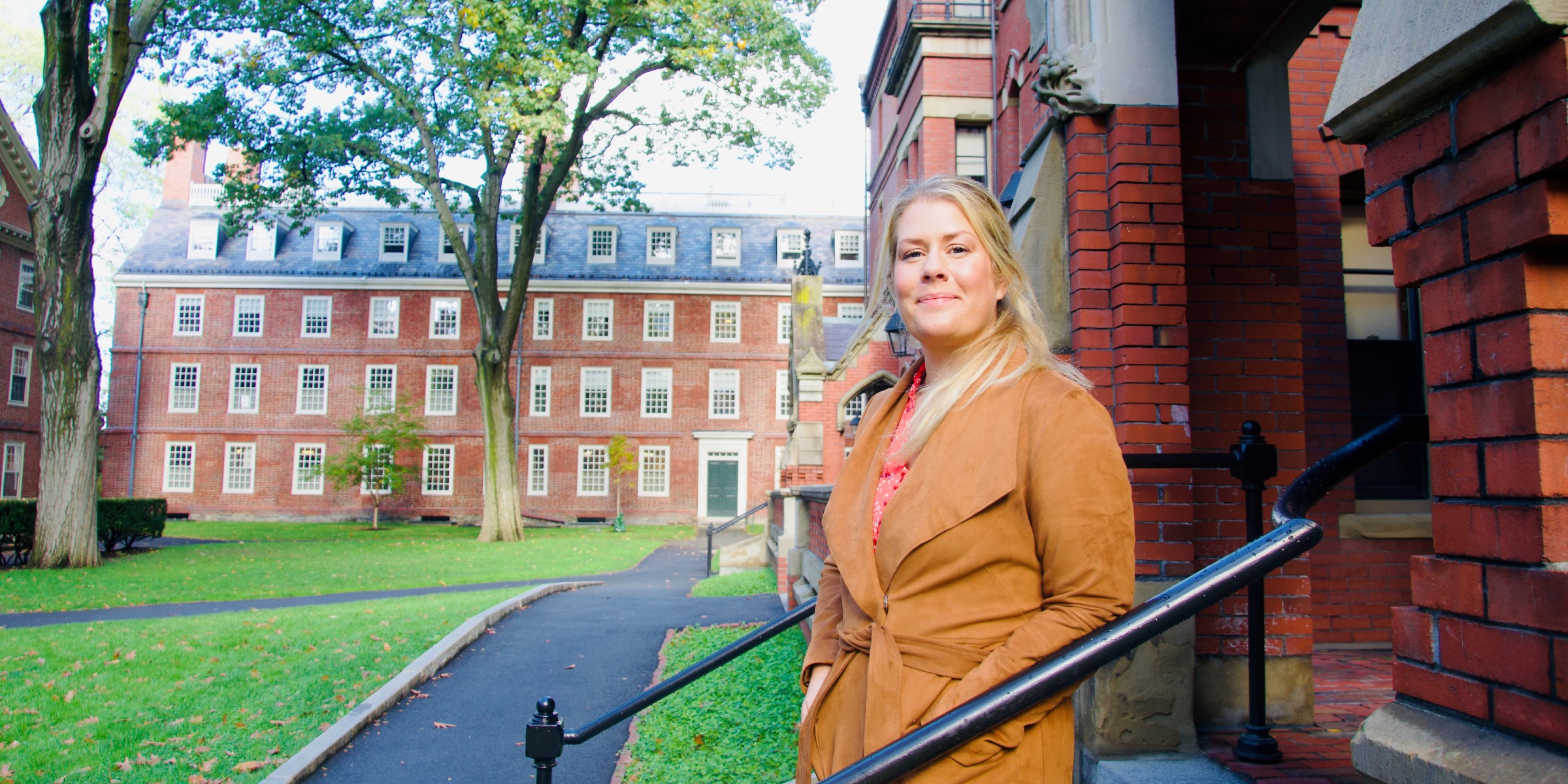Miriam thrives as a Visiting Professor at the Department of Psychology at Harvard University.

Employee of the Month
Miriam Sinkerud Johnson is employed in the Department of Behavioural Sciences at Oslo Metropolitan University, where she was recently promoted to Professor. This summer, she went against the grain and moved to the United States to work as a Visiting Professor at Harvard University.
She specializes in child psychology and cognitive developmental psychology, with a main emphasis on forensic psychology and children who are alleged victims in criminal cases.
In July, Miriam moved to Boston with her husband and three children to spend a year as a Visiting Professor in the Department of Psychology at Harvard University.
"I received this opportunity long before the conflicts between Harvard and the federal authorities arose. For a long time, we were uncertain whether we should go, and we followed the media coverage of the situation at Harvard closely. In the end, we decided to go as planned, and we have no regrets," she says.
"We have been warmly welcomed by the academic community at the department and have noticed little of the conflict in our daily work. However, we are aware of colleagues who have lost both research funding and their jobs," Miriam emphasizes.
How did you get to work today?
I took bus number 66 from Brookline Village to Harvard Square with my husband, who is also a Visiting Professor at Harvard from the University of Oslo. We strolled through the Harvard campus to William James Hall, where we share an office with a skyline view of Boston. First, we drop off our youngest at daycare and then the two older children at school before catching the bus to work.
What's happening at your job at Harvard this month?
Every week we have lab meetings where ongoing projects are presented and discussed. The department also organizes several meetings with international experts, which are exciting to follow. I’m also working on establishing new projects together with colleagues here at Harvard.
Have you learned anything new recently?
Yes, network analysis. Besides that, I’ve learned how to sew teddy bears by hand with my 7-year-old daughter, who recently started sewing classes. They don’t turn out very neat, but I’d say they’re charming. I’ve also picked up a few useful Spanish phrases, like "¡Hasta mañana!" ("See you tomorrow"), which comes in handy when I pick up my youngest from daycare, where most people speak Spanish.
Name one thing that could make your workdays even better.
Honestly, my workdays are as good as they can be. If there’s one thing I miss here in the U.S., it would be the coffee breaks and the informal chats in the hallway with my Norwegian colleagues.
Has anything from your field surprised you recently?
My primary field is child and developmental psychology, with a particular focus on trauma psychology and stress in young children. From a developmental psychology perspective, it has been interesting to follow the public debate in Norway about daycare adaptation and parental leave.
The contrast to experiences here in the U.S. couldn’t be greater: here, there are daycare facilities for infants as young as 8 weeks old, because mothers must return to work, and there is no gradual adaptation period for daycare. In Norway, we have fantastic welfare systems that prioritize the well-being of children. Without the contrast to experiences in other countries, we can sometimes lose sight of how good the conditions actually are and how much worse they could be.
Still, there are also practices here in the U.S. that we could learn from in Norway. For example, in daycare centers, children are grouped based on developmental level rather than age. In schools, the teaching and learning methods are also more individually tailored to each child.
How can OsloMet (universities) become more sustainable in a global perspective?
Sustainability in the university sector, as I see it, involves looking at research in a broader, global perspective. We need to focus more on areas that matter most: climate, health across all age groups, and social inequalities — and address these through collaboration across disciplines and borders.
Many academic communities are working on the same issues and nearly identical research projects without collaborating or pulling in the same direction. This is not sustainable when the overarching goal is to advance knowledge to address global challenges. There is tremendous untapped potential in academia in this regard.
How do your colleagues at Harvard motivate you in your daily work?
Teamwork across academic levels motivates me. There are many clinical projects underway here at the Department of Psychology, where students either lead the projects or work together with established researchers in teams. This is something we should improve at Norwegian universities—actively involving students in ongoing research projects. It’s both incredibly educational for the students and beneficial for the researchers.
It’s also inspiring to experience that researchers here at Harvard, who are stars in the academic arena, are also just regular people you can have casual conversations with at work.
What do you do to bring joy to others at work?
I show interest and curiosity in what my colleagues are working on. I give them compliments and cheer them on for what they accomplish. I think this is something we could get much better at in academia.
The best academic literature you’ve read in the past year?
Right now, it has to be the book Remembering Trauma, written by Professor Richard McNally, whom I am collaborating with here at Harvard. The book addresses one of the biggest and most controversial debates in clinical psychology: can traumatic memories be repressed from consciousness, or are traumatic memories remembered well, and often far better than neutral or positive memories? I believe this book is a must-read for clinicians and researchers working with memory and trauma.
Your cultural recommendation (book, series, movie, theater, or music):
I have two book recommendations. Since we live relatively close to Maine and Cape Cod here in Massachusetts, I’d like to highlight two 19th-century classics. First, there’s the classic of all classics: Moby Dick, written by the American author Herman Melville in 1851, which tells the epic story of Captain Ahab and his quest for the white whale.
The second book is called Cape Cod, originally written by Henry David Thoreau in 1865, and it depicts life on Cape Cod in the 19th century. An amazing book!





